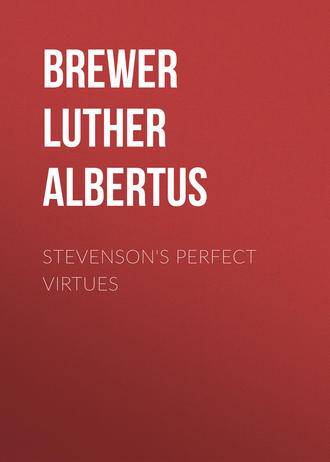 полная версия
полная версияStevenson's Perfect Virtues
Hunt would have his fire left quite to itself, without a tea-kettle, “bubbling and loud-hissing,” which “throws up a steamy column,” as Cowper tells it. Such a fire “has full room to breathe and to blaze,” and he can poke it as he pleases. “Poke it as I please!” he continues. “Think, benevolent reader, think of the pride and pleasure of having in your hand that awful, but at the same time artless, weapon, a poker; of putting it into the proper bar, gently levering up the coals, and seeing the instant and bustling flame above!”
The use of the poker with one’s fire is as natural as shaking hands with a friend. And
Then shine the bars, the cakes in smoke aspireA sudden glory bursts from all the fire,The conscious wight rejoicing in the heat,Rubs the blithe knees and toasts th’ alternate feet.Writing in The Companion in 1828, he remarks:
A man … may begin with being happy, on the mere strength of the purity and vivacity of his pulse: children do so; but he must have derived his constitution from very virtuous, temperate, and happy parents indeed, and be a great fool to boot, and wanting in the commonist sympathies of his nature, if he can continue happy, and yet be a bad man: and then he could not be bad, in the worst sense of the word, for his defect would excuse him.
Hunt quotes approvingly this from Hannah More:
Since life’s best joys consist in peace and ease,And though but few can serve, yet all may please,O let th’ ungentle spirit learn from hence,A small unkindness is a great offence.“Life,” says George Moore, “is a perfect gift, and our duty is to enjoy it; by doing so we can help others to enjoy.”
This was Hunt’s philosophy.
These quotations from his letters, taken from originals in our collection, are indicative of his view of life:
Do not be alarmed about the emptiness of your purse on Monday. In the course of the day you will receive some money at all events – enough to go on with … Meantime I send you two sixpence (mighty sum!) which I have in the last corner of my pocket. You will not despise them, coming with his heart’s love, and his best thanks for your cheerful letters. – Oct. 4, 1829, to Mrs. Hunt at Epsom.
Heaven seems to afford us consolatory thought, and show to us almost certain glimpses of happiness, in proportion as we do its work with cheerfulness: – and what work is more properly the work of heaven than that of helping one another to bear our burdens and strengthen our patience? – Letter, Florence, 4 Nov., 1824, to Bebs, his wife’s sister.
He writes Mrs. Hunt, his “Dearest Molly mine,” thus cheerfully:
I have got the twenty guineas, and settled with Hyatt; but I felt so new, with my waistcoat pocket full of sovereigns, and it seemed such a charge, that I thought I had better bring it up to you myself.
I am again, with bitter heart, forced to disappoint you; but Mr. Bell says, that “certainly, certainly” (emphatically repeating it) I shall have the six sovereigns tomorrow morning … Keep up your spirits.
I forgot to mention … that I have still one of the sovereigns which I brought away with me, as well as five shillings and sixpence in silver; so that I hope I shall have enough, if not quite enough, to pay for the fly on Sunday. If not, perhaps you can borrow a few shillings till the Treasury pay-day.
I shall cut short my sighs as I am wont to do.
I shall regard the whole period as the beginning of that true sunset of life, of which I have so often spoken; for if clouds are still about it, they only serve to enrich what the light of love (the only heavenly light) makes beautiful.
My friends who know me most intimately say there are two things in my life that may not be quite normal – my fondness for work, and my liking for Leigh Hunt. I do not have any apologies to make for either of these characteristics. My admiration for Hunt and my consequent desire to acquire Hunt incunabula could not be brought to fruition if I did not work and earn. The first characteristic noted therefore is the sequence of the second.
I have not seen fit to apologize for either of these traits – the one a luxury perhaps, the other a necessity.
Leigh Hunt as a man and as a writer is worth knowing. He not only loved books, but he made books for others to love. His life at times was almost a tragedy. There were occasions when he did not have the courage to leave his house, so lacking was he in possessing enough clothes to make a decent appearance. At another time he did not have the price of a loaf of bread, and so went hungry. But he never lost his courage, and ever was hopeful and sweet tempered.
Shelley quotes a line seen by him on a sun-dial in Italy: “Colto soltanto le ore serene” – I mark only the bright hours. Hunt and Stevenson saw in their lives from day to day only the bright hours.
And this is the message that The Brewers would send this Christmas time to their friends: “Gentleness and cheerfulness are the perfect virtues.” Only the bright hours are the ones we should see.

